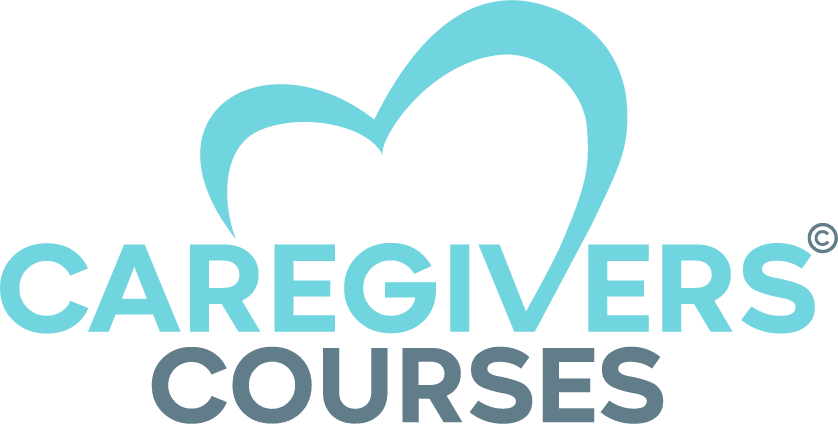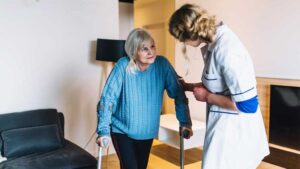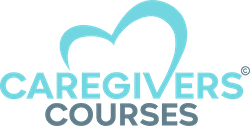What training does a caregiver need? How can they ensure that they comply with their state regulations? Should they pursue further training, even after completing their required modules?
These questions can have a variety of answers depending on a caregiver’s purpose, career goals, location, and experience. A beginner caregiver, for example, may need to start at the basics with CPR and First Aid. Contrastingly, a seasoned caregiver may be better served by a course on the latest mobility-aiding equipment. But whether you’re caring for a loved one, starting a caregiving career, or have been a caregiver for years, there is one thing all caregivers have in common – and that is the need for ongoing training.
Ongoing training is essential for keeping caregivers up-to-date, and ready to provide safe, efficient care. Even in states that do not have a minimum training requirement for certification, the right courses are necessary for preventing accidents, injuries, and mishaps while caring for patients. Without them, you run the risk of engaging in harmful practices that degrade the level of care you’re able to provide.
So how do you get started? And what training does a caregiver need based on their career trajectory? This guide is designed to help you identify and obtain the right care courses for your specific needs, as well as provide excellent resources for getting started.
To start, we will explore the level of training needed for one of the most common forms of caregiving – family care.
What Training Does a Caregiver Need to Care for Family Members?
It is very common for family members to volunteer their services to care for their loved ones. This can be for a variety of reasons, including age, reduced mobility, or disability. To illustrate this dynamic, we will be using the following fictional case.
Suppose that Sandy is a 22-year-old woman, and her grandmother, Margaret, suffers a back injury that leaves her in need of ongoing care and assistance. The family determines that Sandy is the best person for the job, as she lives with Margaret and works from home.
Sandy is now responsible for caring for Margaret in a variety of unfamiliar ways. She now has to help her in and out of bed, drive her to appointments, assist her in the bathroom, and cook nutritious meals according to her dietary requirements. Since Sandy has had no previous experience as a caregiver, she feels overwhelmed at the prospect of taking on these tasks and doesn’t know where to start – and she’s not alone.
Even if you’re not interested in pursuing a career in caregiving, caring for your loved ones still requires a basic amount of training. Here are some of the must-have courses for your roster.
- Fall Prevention. For some patients, falls can be dangerous and even life-threatening. Falls can lead to permanent injuries, especially for patients like Margaret who have mobility and balance issues. A fall prevention course is essential for caregivers like Sandy and will teach her how to make her grandmother’s home safer and more accessible.
- Lifts and Transfers. For caregivers like Sandy, lifts, and transfers can seem daunting. Without prior experience, it can be challenging to determine the best methods for moving a loved one safely and gently. Depending on Sandy’s level of personal strength and mobility, she may also need to learn how to use equipment to help her with the process. A relevant course will provide all the necessary information on how to successfully and consistently complete lifts and transfers.
- CPR and First Aid. Every adult ought to be certified in CPR and basic First Aid and this is especially true for caregivers. In Sandy’s case, a CPR certification could make all the difference in an emergency where her grandmother needs immediate resuscitation before paramedics arrive. That’s why these certifications are often mandated and should be renewed to ensure the caregiver’s information is up-to-date.
- The Basics of Family Caregiving. This is a course that we offer covering the important introductory information that caregivers need to properly assist their loved ones. This course covers a diverse range of important introductory topics like caregiver safety, fall prevention, caregiving basic principles, and how to pursue emotional support as a family caregiver.
With these resources at her disposal, Sandy will be able to confidently care for her grandmother effectively and safely. This will help her to feel less overwhelmed, and more secure in the decisions she makes on a day-to-day basis for Margaret.
Beginner Caregiver Training
Many people are interested in pursuing a professional career as a caregiver. Caregivers can help in a variety of capacities to help improve the lives of others by providing comfort, care, and emotional support when they are at their most vulnerable. These dedicated individuals often want to get started right away, but quality introductory caregiver training is mandatory to enter the field.
Take our fictional character Carlos for example. Carlos has just graduated from high school and is interested in pursuing a career as a caregiver. He is hoping to apply at his local nursing home as a night-shift caregiver. In this role, he would be helping elderly patients use the restroom at night, handle with incontinence, sanitizing the facilities, and helping to prepare and distribute their evening meals.
While his state does not require any mandatory training for caregivers, he wants to ensure that he is viewed as a serious candidate with a strong resume. He is already certified in CPR and First Aid, but wonders, “What training does a caregiver need beyond that?”
Firstly, Carlos should pursue several of the same courses discussed in the previous example, including fall prevention, lifts, and transfers. But he should also complete some courses in the following categories.
- Alzheimer’s and Dementia Care Training. Most nursing homes have multiple patients with either Alzheimer’s or Dementia. That’s why Carlos needs to pursue the proper Alzheimer’s and Dementia care training to learn how to best meet the unique needs of these patients. These courses can also provide more in-depth education on the symptoms of Alzheimer’s and Dementia and how to prioritize patient safety.
- Infectious Disease Control. Providing a sanitary environment for patients will be a major part of Carlos’s job, so he must understand how to assist in preventing the spread of pathogens to his patients. An infectious disease control course can teach him how to sterilize equipment, prevent patient-to-patient disease transfer, and identify potential outbreaks in the early stages.
- Nutrition Training. Nursing home patients often have restrictive dietary needs. If Carlos is going to be assisting with food prep, a nutrition course will better equip him to be sensitive to his patient’s food requirements. It will also teach him how to ensure his food prep environment is sanitary, and how to avoid cross-contamination, which can make elderly patients very ill.
- Caregiving 101. This comprehensive introductory course provides basic information about what it’s like to be a caregiver, how to become a caregiver, and what caregivers can do (and not do) within their role. The course is based on national standards and covers a variety of important introductory topics.
Once Carlos has completed the proper introductory caregiver training and received his relevant certificates, he will be ready to stand out in a competitive marketplace and provide top-notch care to his patients.
Advanced Caregiver Training
Some caregivers have been in the field for a long time, and have already completed the basic training required to get their start. At this level, many professionals decide that they want a change of pace or to specialize in a specific type of care. Note the following example.
Angelique has been an in-home caregiver for ten years helping patients with disabilities to safely perform day-to-day tasks like bathing, cleaning, cooking, and dressing. However, after some thought and consideration, she has decided that she wants to shift her discipline. She has decided that she wants to provide in-home hospice care or palliative care to patients, but is unsure of what courses to pursue to prepare for her new role.
Further training to transfer into the medical field by becoming a registered nurse or other licensed professional will be more costly and time-consuming, but could still provide value to her if it aligns with her long-term career goals. While there are many advanced forms of training Angelique could pursue, the following are basic courses that can help advance her career as a caregiver quickly and at minimal cost.
- Hospice Care Training. A hospice care training course will teach Angelique the basics of providing end-of-life care for patients. It will include modules on how to keep patients comfortable, content, and relaxed, as well as how to provide emotional support to the family during the grieving process. If Angelique is interested in pursuing hospice specifically, a designated course is essential for strengthening her application.
- Certified Nursing Aid Training. Many caregivers eventually transition into becoming CNAs. This legally qualifies them to provide more advanced medical assistance to patients than a standard caregiver. This could be very helpful to Angelique if she is interested in providing hospice care, which often requires professionals to take and record vital signs or administer basic medication.
- HIPAA Compliance Training. Many caregivers are legally subject to the same HIPAA regulations as standard medical professionals. That is why it’s important for individuals in the care profession to be aware of the regulations surrounding what they are and are not allowed to share or repeat about patients. This is especially important in Angelique’s case, as she will be handling sensitive patient information in a hospice setting.
While Angelique is certainly not lacking in caregiver experience, this suggested training will allow her to pivot with confidence to provide her patients with the best possible care.
Recurring Caregiver Training
Once you have completed all the necessary training for your caregiving discipline, you will be ready to start your next chapter as a caregiver – but it doesn’t stop there. Even seasoned caregivers with years of training under their belts will need to update and renew their training from time to time. Some states even legally mandate that caregivers renew key certifications every few years, or risk losing their ability to continue working.
But what training does a caregiver need to revisit, and what courses only need to be completed once? How can a caregiver determine when it’s time to update their certifications?
While some states have legal mandates for how often certain certificates need to be updated, some do not. Even so, a good caregiver will see the value in ensuring that their knowledge is as current as possible. A good rule of thumb is to think about what information a caregiver may need to be refreshed on, and what standards evolve. Here are some basic standards that can help determine when it’s time to revisit past training.
- The updating of laws or regulations. Caregivers should always be mindful of the regulations and laws within their states, ensuring that they are staying up-to-date on any changing expectations or rules. A change in the legal standards for caregivers within one’s locality is certainly a sufficient reason to revisit old courses and ensure that all credentials are up-to-date.
- Shifting career trajectories. When caregivers are thinking about switching employers or caregiving disciplines it’s always a good idea to brush up on previous training. Suppose you’re interested in becoming an in-home caregiver for the elderly. You completed a course on Alzheimer’s Care ten years ago when working in a nursing home, but have since been working with post-stroke recovery patients. While you may remember a good deal of your original training course, industry standards can change substantially in ten years. Seeking out a fresh training module will allow you to learn critical information that will be highly beneficial within your new role.
- Major industry breakthroughs. New equipment, treatments, and technologies are always worth investigating within the caregiver field. Staying current with these developments will ensure that you are always prepared to provide patients with the best care available to them.
- Lifesaving or high-stakes training. CPR and First Aid training certifications should always be up-to-date for caregivers at all times. Many states have a set requirement for how often these must be updated, but it’s recommended that professionals renew their certifications at least every two years.
By being mindful of the need to pursue continuous education and revisit previous information, you are setting yourself up to be as well-informed and prepared a caregiver as possible. Not only will this improve your overall working knowledge of the care industry, but it also allows you to stand out for care positions among other applicants, strengthening your career mobility potential.
We hope this guide was helpful to you wherever you are in your caregiving journey. If you would like to view our full roster of comprehensive, you can check out our affordable caregiver courses. If you would like to read more on this subject, we encourage you to explore our blog for further resources.


![Self-Care for Caregivers [Tips from Experts]](https://caregivercourses.net/wp-content/uploads/2024/07/Self-Care-for-Caregivers-Tips-from-Experts-300x169.jpg)


